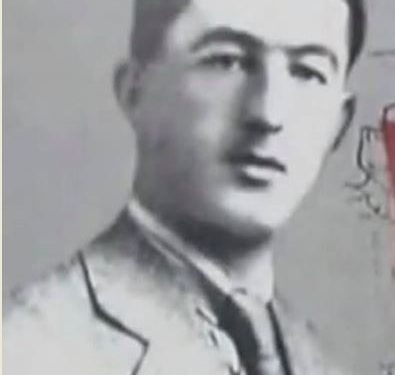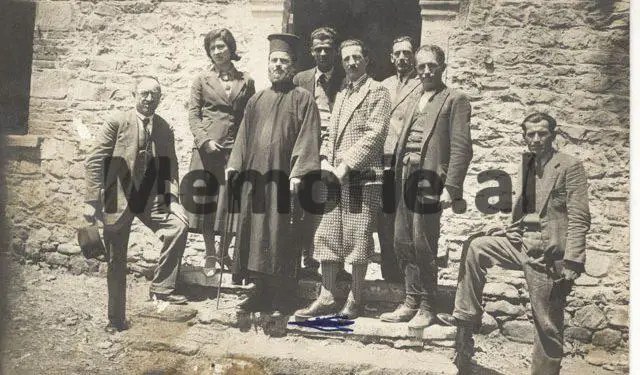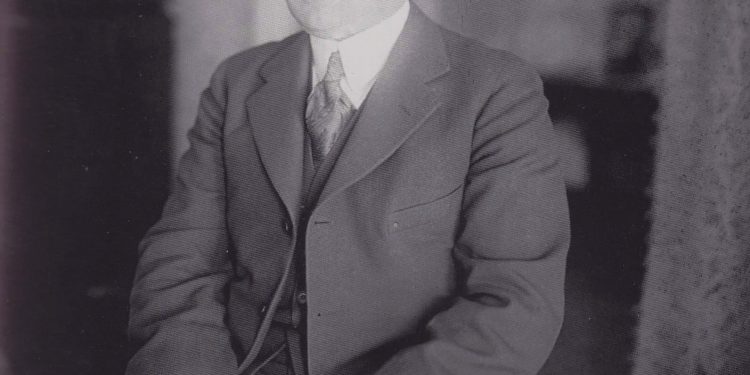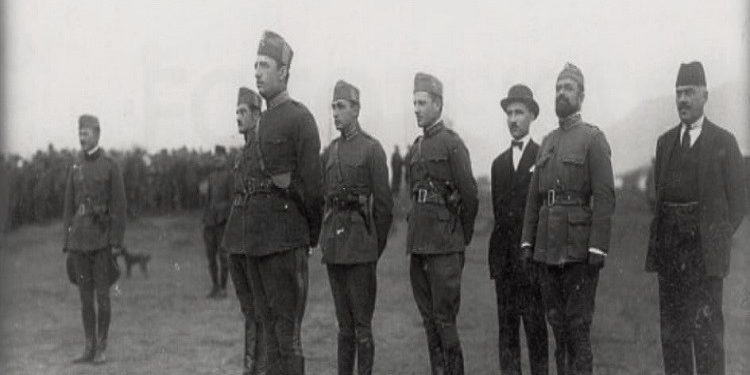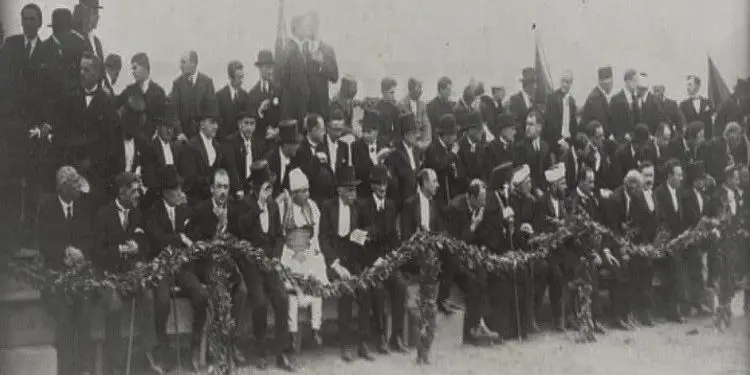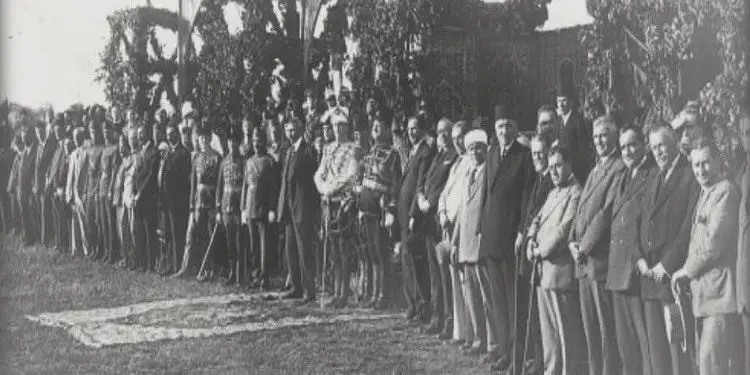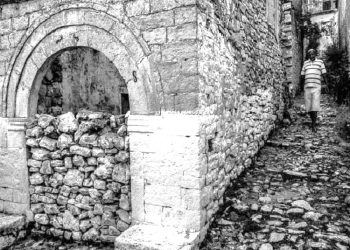By Eugen SHEHU
Part Two
Memorie.al / It is almost like saying an axiom, the expressed opinion that history is the awake memory of a people! It never sleeps. It cannot sleep, otherwise it would be the death of the nation. This does not mean at all that there cannot be people who seek to kill history. On the contrary, they are in abundance and this was especially proven by the half-century-old Albanian dictatorship, which not only falsified and denigrated a relatively long period of the history of this century but, especially, tried to kill it. What weighs heavily in Albania, but also in Kosovo, Montenegro and Albanian Macedonia, was called the “Zog Period”, which was dressed up by communist historiography, in all its blackness, as suited Slavic-Orthodox, Greek-Serbian-Bulgarian and Italian expansionism.
Continued from the previous issue
Because the country in this period was going through waves of provincial revolts and separatist rebellions, the Albanian Prime Minister had to structure new strategies that could keep the Albanian state afloat, so much attacked, both by our anarchic spirit and by revolts initiated by foreigners. From this two-year period, our archives contain hundreds of thousands of orders and instructions from Ahmet Zog, which testify not only to his intelligence and foresight in establishing the Albanian state, but also to his determination to adapt to Western models of state functioning.
However, his activity in these two years cannot be summarized in documentary terms. Because the patriotic dimension of Ahmet Zogu would be complete, he would often leave his offices and papers to be among the soldiers and cadres of our national army, which was guarding the borders of Albania. These movements of the Albanian Prime Minister from Vermoshi to Konispol could not have only the spectacular side of the issue.
On the contrary, the combat intuition of Ahmet Zogu significantly influenced the entire structuring and attitude of the national forces in terms of preserving our territorial integrity. The orientations of the Albanian Government led by Prime Minister Ahmet Zogu would always be clear and would try to follow the trends of the time, aiming of course at the civilization of Albanian society and the approximation of its mentality to the mentalities of Western societies.
Prime Minister Ahmet Zogu himself, in the first days of taking office, literally stated; “I believe that today’s government will realize all political sentiments and especially the idea that we are going to establish a Western state full of civilization…! The government will in no way hinder the freedom of the people and the press and will be ready to welcome any conversation that will be held for the good of the Albanian state.
Our state is small and its policy will be clear and without imaginations, which could cause us great harm… We will be friends with neighboring states and will respect them, asking them to respect our independence and full integration of our state, and along with these, respect our full economic independence.” (Archives of the Albanian Prime Minister’s Office, fund 47, speech of the Prime Minister before the cabinet, December 21, 1922).
Personally, I thought that Ahmet Zogu entered the few ranks of those Albanian politicians, unique, through their words and deeds. The messages mentioned above were transformed with great driving force, aiming at the modernity of the Albanian state which was swaying between the waves of fate like a wooden boat in the waves of the sea. In general, as a leader, Ahmet Zogu never played in the politics of the scenes, because he knew their dangers.
He also declared the desired good neighborliness without ever taking his all-seeing gaze from every pyramid of the border of his homeland. What happened in Albania in 1924, when Fan Noli cold-bloodedly, because passions often push a person into dramatic blindness, but still I think that in most Albanians, the opinion is clear that the Nolist movement was until the end an imitation of the Bolshevik Revolution of October in 1917.
Noli (who was baptized a priest in America by Russian bishops), expressed the ideas of a pan-Balkanism without knowing the political background of Russian-Serbian-Greek Orthodoxy, which aimed at introducing a regional war among Albanians and definitively destroying Albania. Here I think that Ahmet Zogu, again, testified again, with his knowledge of a high-class politician, who, analyzing the turmoil created by Noli’s policy, Ahmet Zogu left Albania, not supporting the regional war that could develop.
He was and always remained, a sworn enemy of those who sought blood feuds and he proved this with his well-known opponents, such as: Hysni Lepenica, Kostë Çekrezi, Ali Kelmendi, Fan Noli, Shefqet Skupin and dozens of other Albanian nationalists and communists. His departure from Albania for several months caused deep crises in the country at a rapid pace, while Noli, expecting the help and support of the Slavic-Greek-Orthodox brotherhood (who were waiting for the peak of the Albanian crisis to then devour Albania), disappointed the West of Europe, for the country of the Albanians.
So as Zogu arrived in Tirana on December 24, 1924, the people again foresaw that his hopes for a state could not be extinguished like soap bubbles. The truth is that Ahmet Zogu, again took the road, just like in 1920, when he returned from Lushnja, but he could not be afraid, he knew fear. This is the reason that the entire people approved his return in late December 1924, and even cheered this return. The savior of the nation, in this joyful feeling, certainly foresaw other great sacrifices that he had to make. The Italian newspaper ‘Mezzogiorno’ a few days later, would write in large letters that;
“The Renaissance of Albania began only in 1924, when Ahmet Zogu, entering at the head of his victorious army, freed the country from the wars of the parties and people of the government without value and foresight”. So, on February 3, 1925, the National Assembly, born of the will of our people, proclaimed the first Albanian Republic with Ahmet Zogu, President and Commander-in-Chief of the National Army. In fact, at that time, Ahmet Zogu, was placed at the head of the Albanian Republic which, could be clearly outlined, especially against the background of the Albanian political reality.
If you take a cursory look at some archival documents, statements or interviews of the Albanian President of that time, you cannot help but notice a measured attitude that he emphasized towards civilized Europe. Even though he won with his opponents, even though he was able to establish a stable order and complete control of the state, he did not suffer from the syndromes of the great chimney according to feudal rites. Not infrequently, he considered his enemies to be real collaborators.
In the years 1925-1928, Ahmet Zogu tried to bring relative prosperity to his compatriots. Because he judged that Greece and Yugoslavia remained enemies of the Albanians and Albania, and therefore could not serve as states on which he could rely (therefore he reinforced the protection of the borders well), he undertook a series of negotiations for economic relations with Italy. Of course, it cannot be said today that Italy did not have territorial intentions towards our country, but nevertheless Ahmet Zogu could not forget Vlora in 1920, where he himself, at the head of some brave Matjani, had fought to throw the Italians into the sea.
While Ahmet Zogu was signing the Pact of Tirana with Baron Aloisi in 1926, he was a little tempted, so when he presented his Italian friend with a future monarchy. I say he was tempted because Baron Alois not only showed himself willing, but assured him that he could be crowned with an Italian princess. But the idea was not missing that if this were to be realized, the Albanian President should recognize the decision of the Conference of Ambassadors in 1921, or more precisely, an Italian protectorate.
Faced with this proposal, Mati’s son withdrew without hesitation because he could never imagine his people and homeland under foreign protectorates. However, during these years, some changes were felt in poor Albania. Some roads began to be opened, new buildings and palaces were built, as well as bridges (which are still inherited from Zog’s time), the Albanian army and gendarmerie began to be strengthened and organized.
In parallel, with Ahmet Zog’s mind, the evolution of thoughts about the proclamation of the Monarchy continued unabated. At that time, at that time, Albanians did not consider the monarchy as something new, in the form of a miracle. When all the countries of Europe and the Balkans were Monarchies, but for us Albanians the example of Skanderbeg, who united all the Albanian principalities, was especially valuable, leaving indelible traces not only in our history, but in that of all of Europe. In this regard, I think that even in 1913, when the Great Powers appointed Prince Vidin in Albania, they nevertheless envisaged the Monarchy as the most suitable form of regime.
It is also worth saying that Ahmet Zogu, gradually, quite naturally, with bold intentions, had thought about the Monarchy and the Royal Crown from an early age. I do not believe that it is a coincidence that foreign scholars have stated that in Istanbul, at the military school, the brave Mati was very fond of the figure of Napoleon. This thesis is even reinforced by the foreign press during the Monarchy, where it is stated that; “Zogu has claimed that during his stay in Vienna, he spent a large part of his time not only studying Western culture and political organization, but also had the opportunity to establish personal connections with both the empire of Franz Josef and the emperor Karl”. (Nationale Zeitung, September 14, 1928).
A beacon of economic stability, order, to some extent established and steps forward in terms of the education of our people, this was, in two quick strokes, the situation in August 1928, when the new elections for the Constituent Assembly were organized. These elections were naturally accompanied by numerous controversies in the press of the time. As usually happens in such political turns, there were pros and cons to this step that President Ahmet Zogu was taking. Of course, I do not undertake to analyze the position of the press of that period, but I was very attracted by a position of an Italian newspaper where it literally says;
“Through this constitutional change, Albania reaffirms its independence, raises the need for internal pacification, consolidates central power and shows the determination and confidence of a man who was able to provide his people with the benefits of peace and internal public order. Ahmet Zogu’s greatest merit is that he saved the country from the machinations of Pan-Serbism, thus preventing Albania from turning into a Yugoslav province…”! (Gazeta “Popolo d’ Italia”, August 25, 1928).
On September 1, 1928, at 5 p.m., the 33-year-old King of Albania would declare before the assembly members: “Gentlemen! Today I am addressing you as a friend, collaborators of the common ideal… After today, we have a more difficult task than we should: to show the world that the Albanian, like every civilized people, can also receive culture, which is the wealth of all and the ideal of the whole world. Only in this way, by ensuring a good future for our country, can we pay a historical duty…!
As you complete your sacred duty, return to your countries, tell the sovereign people that its Leader sees himself as every Albanian, and as quickly and with pleasure we have placed Gjergj Kastrioti on the throne, so quickly and with pleasure we will always find him ready to sacrifice everything, if necessary even his life, after his wish and for the good of the country. Gentlemen, let us stand before history with our faces white”! (Archives of the Prime Minister’s Office, Constituent Assembly Fund, File 3, date 1 September 1928).
Now, for King Zog, economic reforms had to be accelerated as soon as possible, since poverty and deprivation classified Albania among the poorest countries in Europe. Here too, his great energy, the passion with which he worked, and the foresight with which he judged situations were evident. Exchanges, mainly with Italian capital, took a new turn. The first American and English investors also arrived, aiming to invest in the mineral industry. Memorie.al
Continues next issue




